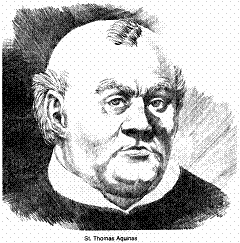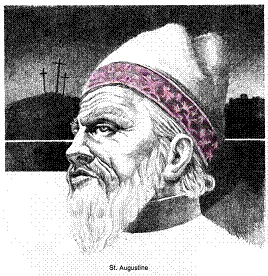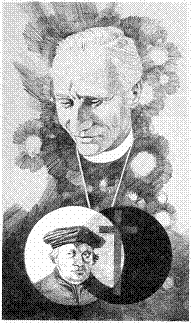Is Luther's Doctrine of Justification Compatible with Orthodox Catholic Theology?
Chapter 1 — The Viewpoints of Four Catholic Scholars
McSorley
In the fall of 1967, Harry J. McSorley wrote two closely related articles regarding Luther's doctrine of justification and the Catholic Church.1 To show the centrality which this doctrine played in Luther's battle with the Papacy, McSorley gives the following citation from Luther's 1535 Lectures on Galatians:
If the Pope will grant unto us, that God alone, by his mere grace through Christ, doth justify sinners, we will not only carry him in our hands, but will also kiss his feet.2
Then, with great conviction, McSorley states:
The Pope—more precisely, the teaching office of the Catholic Church—does teach that the sinner is justified solely by the grace of Christ. Solely by grace," as it is used here, is opposed to through the unaided efforts of the unjustified man."3
The question that Is sure to arise at this point is why Luther found It necessary to revolt In the first place if Rome's "official teaching" is so similar to his own. McSorley anticipates this objection and gives a carefully prepared answer: Luther was reacting against the semi-Pelagianism of Gabriel Biel and William Ockham, whose "via moderna" was an obvious departure from traditional Catholic thought. Luther was right in opposing this decadent scholasticism which taught that when a sinner does what he is capable of doing by his own natural, fallen powers (without the assistance of God's prevenient grace), he is able to "merit the grace of forgiveness of sins." This late medieval scholasticism against which Luther raised his voice taught that "the sinner could take the first step on the road to forgiveness and justification by his own unaided powers."4
Over against this, McSorley feels that Luther's primary spiritual concern was to restore the truth that "man is justified by faith alone—not by merely any human efforts" and that "the sinner is in bondage to his sin, unable to will anything truly good (coram Deo) unless he is liberated by the grace of Christ."5
  Then comes McSorley's bombshell. He assures his readers that orthodox Catholic theology—in actuality— has always believed what Luther rose up to defend! It just so happens that Luther came upon the scene at a time when the "real" Catholic understanding of justification was partially obscured by the careless theological speculations of Ockham and Biel. McSorley cites Augustine, Anselm, Bernard, Gregory of Rimini and the second Council of Orange to prove that the Roman Church has traditionally opposed semi-Pelagianism. He subpoenas Thomas Aquinas to testify concerning the "truth of faith" that the beginning of salvation is always the result of God's work in us, never the result of our own efforts. The Council of Trent takes the stand to declare that the sinner is a captive of Satan and that the Holy Spirit must be present in order for the sinner to take even the first step toward justification. Even Vatican II provides evidence for McSorley's theory: Then comes McSorley's bombshell. He assures his readers that orthodox Catholic theology—in actuality— has always believed what Luther rose up to defend! It just so happens that Luther came upon the scene at a time when the "real" Catholic understanding of justification was partially obscured by the careless theological speculations of Ockham and Biel. McSorley cites Augustine, Anselm, Bernard, Gregory of Rimini and the second Council of Orange to prove that the Roman Church has traditionally opposed semi-Pelagianism. He subpoenas Thomas Aquinas to testify concerning the "truth of faith" that the beginning of salvation is always the result of God's work in us, never the result of our own efforts. The Council of Trent takes the stand to declare that the sinner is a captive of Satan and that the Holy Spirit must be present in order for the sinner to take even the first step toward justification. Even Vatican II provides evidence for McSorley's theory:
By himself and by his own power, no one is freed from sin... On the contrary, all stand in need of Christ.
The followers of Christ are called by God, not according to their accomplishments, but according to His own purpose and grace. They are justified in the Lord Jesus.6
McSorley asserts that the burden of proof rests on those who claim to see any crucial difference between Luther and Catholic tradition. His conclusion is that "in regard to Luther's central Reformation concern, the doctrine of justification by faith alone . . . there is no essential incompatibility between Trent and the Lutheran Confessions."7 In a final burst of dogmatic assurance, McSorley assures his readers that if only Luther had lived to see Trent, Vatican I and Vatican II, he would have had to admit that his "central reformation concern" is also a concern of the Catholic Church.8 Presumably, it was an unfortunate misunderstanding which prevented Luther from carrying the Pope in his hands and kissing his feet.
Van de Pol
In 1952, Catholic theologian W. H. van de Pol issued a book entitled The Christian Dilemma9 in which he made assertions very similar to those now being made by McSorley. Van de Pol's thesis was that the Reformers were battling a semi-Pelagianism which they mistakenly thought was integral to Roman orthodoxy. This, however, was an unfortunate "misunderstanding," because Roman Catholicism has always believed in sola gratia.10 Catholicism affirms that:
The restoration of fallen man is accomplished and merited entirely by Christ . . . Faith, then, is the basis of justification; on no account are we justified through the fulfillment of the Law by our own powers . . . Neither can we accept that justification is brought about partly by the help of God and partly by man's own strength, for this would be to fall back into semi-pelagianism . . . Without grace, without faith, without being in Christ, we are unable to do anything.11
Van de Pol is sure that there is nothing incompatible between Luther's doctrine of justification and Roman orthodoxy. He underscores his point by throwing out the following challenge to Luther's spiritual descendants:
It remains now for the Reformation to make clear to the Catholic Church what new discovery Luther made to shed new light on the testimony of the Scriptures, and to attain to a more profound understanding of the Gospel than was possible before his arrival on the scene.12
Bouyer
Louis Bouyer makes identical claims in his book, The Spirit and Forms of Protestantism. According to Bouyer, Luther's view of salvation, in its most basic form, "is in perfect harmony with Catholic tradition, the great conciliar definitions on grace and salvation, and even with thomism."13 Bouyer pictures the pre-Reformation Luther as a sincere monk who was struggling to gain salvation through his own efforts and finally realized (in despair) that man is totally incapable of "any effective initiative towards salvation." But, of course, the system of semi-Pelagianism under which Luther was struggling had already been condemned by the Catholic faith, both in the Councils and in the theology of Thomas Aquinas.14
Unfortunately, Bouyer continues, Luther had imbibed some of the "decadent scholasticism" of his age. It is too bad Luther could not have been trained more thoroughly in the writings of Thomas Aquinas, whose sound theology might have delivered him sooner from his agonies.15 As it turned out, Luther had to discover the hard way that salvation depends, not on man's strength, but upon God's mercy. This was by no means a new discovery. Luther had merely returned to the true and ancient teaching of orthodox Catholicism, which also believes in "free salvation" and that "man without grace can do nothing of the slightest value for salvation."16
Bouyer admits in passing that Luther's notion of "extrinsic justification" is incompatible with Catholic dogma. Bouyer defines extrinsic justification (correctly) as being something which takes place "exterior to the believer" with the result that the Christian—although just in God's sight—remains a sinner in himself.17 Bouyer points out that according to this idea, the believer must always feel that his own righteousness is insufficient to please God or insure salvation. His right standing with God is entirely independent of any "interior change."18 Bouyer asserts, however, that this was not part of the "main" Protestant position or one of Luther's "basic" propositions.19 Rather, it was an overreaction on Luther's part as he advanced in his conflict with Rome. Furthermore, says Bouyer, Luther did not even teach the doctrine of extrinsic justification consistently himself but contradicted it on many occasions.20 Bouyer feels that he has presented
. . . the clearest evidence, that Luther's basic intuition, so far from being hard to reconcile with Catholic tradition, or inconsistent with the teachings of the Apostles, was a return to the clearest elements of their teaching, and is in the most direct line of that tradition.
We need not insist on the importance of this fact. . . If both Protestants and Catholics could be persuaded of it, the object of the basic antagonism of Protestants to the Church would cease to exist. It would be evident that Protestantism, reduced to what Protestants regard as its essence, was under no necessity to embody itself in schism and heresy.21
Since Luther's chief concern was to discredit semi-Pelagianism, and since Catholicism also teaches that man cannot even accept the offer of salvation without God's enabling and that faith itself is a gift, are the two really so far apart? Bouyer thinks he can see a striking harmony between the two.
 Tavard Tavard
Catholic scholar Georges Tavard wrote his book, Protestantism, in 1959. He also feels that there is no real contradiction between Roman Catholic theology and Luther's gospel. Tavard explains that when Luther began his work as a Reformer, the gospel was in "partial eclipse." The Council of Trent, however, "reformulated" the gospel afresh and corrected the abuses connected with it.22 Unfortunately, in 1546 the divisions in Christendom had already progressed too far. Side issues had come into the controversy, and the Protestants were too embroiled in the fight to admit that Luther's original concern had been endorsed by the Council.
Tavard feels that Luther's chief concern was to hold up the truth that man does not originate anything in his salvation and that everything comes from Christ. Therefore, in view of the Council of Trent, Luther's doctrine of justification is compatible with Catholicism.
Synthesis
The preceding examples—McSorley, van de Pol, Bouyer and Tavard—give some indication of the approach taken by Catholic authors in recent years toward Luther's doctrine of justification. The various aspects of this approach can be synthesized as follows:
1. Luther was right in protesting a decadent scholasticism of his day. This semi-Pelagian scholasticism, however, did not faithfully represent "real" Catholic theology (as Trent subsequently demonstrated).
2. Luther's chief and original concern was merely to discredit semi-Pelagianism and to uphold the truth that salvation comes, not through man's strength, but by God's grace.
3. His idea of "extrinsic justification" was brought into the controversy only later and was never really among his "basic" propositions. He himself contradicted this theory.
4. Luther's chief concern, the concern that caused him to separate from Rome, is also the concern of orthodox Catholic theologians, Thomas Aquinas and the Church Councils. If Luther were alive today, he would see that to continue his protest is theologically pointless.
These interesting claims—comprising what might be called the "compatibility theory" between Catholicism and Luther—must be carefully investigated.
———————————————
Footnotes:
1 Luther, Trent, Vatican I & II," McCormick Quarterly 21 (November 1967): 95.104, and 'The Key Issue of the ReformatIon," Dialog 6 (Autumn 1967): 261 -264.
2 Quoted In McSorley, Luther, p. 100.
3 Ibid. In the footnote, he adds for the sake of doubters: "Here we are stating the church's official teaching."
4 "Key Issue," p. 283.
5 "Luther," p. 99.
6 Quoted in "Key Issue," pp. 263-264.
7 "Luther," p. 99.
8 Ibid., p. 104.
9 Trans. G. van Hall (London: J. M. Dent & Sons, 1952).
10 Ibid., pp. 37-40.
11 Ibid., pp. 96-97.
12 Ibid., p. 97.
13 Trans. A. V. Littledale (Cleveland: World Publishing Co., 1964), p. 13.
14 Ibid., pp. 10-11.
15 IbId pp. 11-14.
16 Ibid., pp. 44-48.
17 Ibid., p. 45.
18 Ibid., pp. 143, 148.
19 Ibid., pp. 44-45.
20 Ibid., p. 139. I will examine these alleged contradictions in the second part of this essay.
21 Ibid., pp. 43-44.
22 Henri Daniel-Rops, gen. ed., The Twentieth Century Encyclopedia of Catholicism, 148 vols. (New York: Hawthorn Books, 1959), vol. 137: Protestantism trans. Rachel Attwater.
|

 Then comes McSorley's bombshell. He assures his readers that orthodox Catholic theology—in actuality— has always believed what Luther rose up to defend! It just so happens that Luther came upon the scene at a time when the "real" Catholic understanding of justification was partially obscured by the careless theological speculations of Ockham and Biel. McSorley cites Augustine, Anselm, Bernard, Gregory of Rimini and the second Council of Orange to prove that the Roman Church has traditionally opposed semi-Pelagianism. He subpoenas Thomas Aquinas to testify concerning the "truth of faith" that the beginning of salvation is always the result of God's work in us, never the result of our own efforts. The Council of Trent takes the stand to declare that the sinner is a captive of Satan and that the Holy Spirit must be present in order for the sinner to take even the first step toward justification. Even Vatican II provides evidence for McSorley's theory:
Then comes McSorley's bombshell. He assures his readers that orthodox Catholic theology—in actuality— has always believed what Luther rose up to defend! It just so happens that Luther came upon the scene at a time when the "real" Catholic understanding of justification was partially obscured by the careless theological speculations of Ockham and Biel. McSorley cites Augustine, Anselm, Bernard, Gregory of Rimini and the second Council of Orange to prove that the Roman Church has traditionally opposed semi-Pelagianism. He subpoenas Thomas Aquinas to testify concerning the "truth of faith" that the beginning of salvation is always the result of God's work in us, never the result of our own efforts. The Council of Trent takes the stand to declare that the sinner is a captive of Satan and that the Holy Spirit must be present in order for the sinner to take even the first step toward justification. Even Vatican II provides evidence for McSorley's theory: Tavard
Tavard